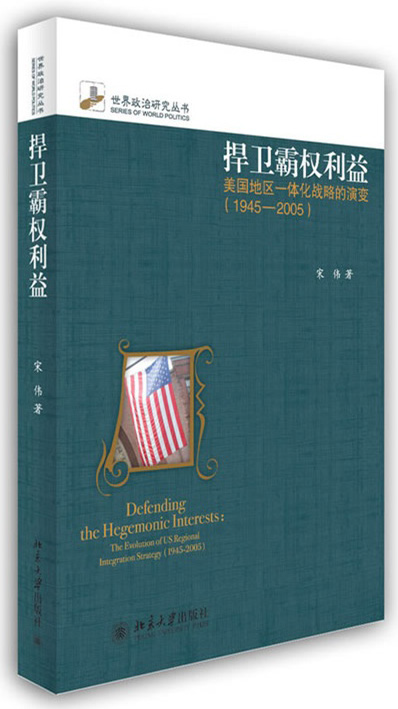
Defending the Hegemonic Interest: The evolution of U.S. regional integration strategy (1945-2005)
Author: Song Wei
Publisher: Peking University Press, 2014
Since World War II, the study of U.S. foreign policy has been multifaceted and fruitful, with a focus on how to understand the trends in U.S. foreign policy and explain them on a theoretical level. Dr. Song Wei’s new book, Defending the Hegemonic Interest: The evolution of U.S. regional integration strategy (1945-2005) probes deeply into the issues and constructs a new research framework.
First, it uses the neo-realism paradigm to explore U.S. foreign policy. The book defines U.S. hegemonic interest based on the nation’s power ranking and position in the international system, explains the evolution of its regional integration strategy, and promotes the innovation of Neo-Realist Theory. The author tells us with absolute certainty that it is of vital necessity to consider the influence of structural factors and the way they work when we attempt to analyze the foreign policy of great powers. Otherwise, we are in no place to interpret the evolution of foreign policy.
Second, it gives an insightful explanation of the pattern and process of U.S. foreign policy. After the Cold War, as the undisputed hegemon of a unipolar world, its behavior has had a certain effect that resonates throughout the global system. For one, the United States can cause a systemic impact on international relations. Also, the United States’ ability to act unilaterally is reinforced while structural constraints are undermined. Defending the hegemony can not only explain the evolution of its regional integration strategy in the main post-war area but also shed light on the basic trend of its foreign policy at the dawn of the Cold War.
At last, I want to point out two questions that the book could address:
First, the author could write on how to properly handle the relationship between power and system. The author explains the evolution of U.S. regional integration strategy by setting power ranking as independent variables and position ranking in the international system as disturbance variables but fails to give a reasonable answer to the question: To what extent is position ranking independent of power ranking.
Second, it could discuss how to apply to the analysis of some rising nations’ foreign policy. This book implies a core theoretical logic that international status shapes a nation’s foreign policy, which is best manifested in the U.S. hegemony. Naturally, we can adopt the same logic to analyze the foreign policy trend of other great powers, especially how rising international status affects a nation’s diplomatic strategy.
In a word, Defending the Hegemonic Interest: The evolution of U.S. regional integration strategy (1945-2005) reflects the author’s strong academic background and persistent academic pursuit, demonstrates young scholars’ deep understanding in international relations theory and the effort to put what they have learned into practice and to blend into the mainstream of international academic circles.
Chen Xiaoding is an associate professor at the Institute of Central Asian Studies at Lanzhou University.
The Chinese version appeared in Chinese Social Sciences Today, No. 656, Oct. 15, 2014.
Translated by Yang Xue


 PRINT
PRINT CLOSE
CLOSE